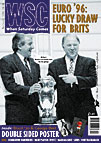 Reading supporters knew how Leicester City fans felt when Mark McGhee decamped to Wolves, as Roger Titford explains
Reading supporters knew how Leicester City fans felt when Mark McGhee decamped to Wolves, as Roger Titford explains
What’s so great about Mark McGhee that he’s managed to break 25,000 hearts in Reading and Leicester and cost his new employers around £1 million compensation in the past twelve months? What makes him last year’s most expensive temp?
He talks a good story. He looks like a manager on the rise, with his big club background, including a spell on the continent, a blessing from Alex Ferguson, some judicious appearances on Sky, a positive outlook and a commitment to attractive, passing football.
And, unusually in the modern age, beneath the well-polished media gloss there is a solid core of managerial achievement. Compare the last two champions of Division Two, Birmingham City in 1995 and Reading in 1994. In pursuit of that honour the Blues’ transfer dealings and wage bills became the stuff of legend, while McGhee was still just about in pocket in the transfer market in his first three years.
He was prepared to look far and wide for his signings: Shaka Hislop from American college football, Andy Bernal from Sydney Olympic and Dariusz Wdowczyk from Celtic. He was prepared to take a chance in scrapping the reserves and investing everything in the first team. Backed by the benevolent chairmanship of John Madejski he was able to leave the club in the best League position in its long history a mere three and a half seasons after near bankruptcy. Everyone ought to be damn grateful.
At Leicester, too, reports were good. Though there was not much honour there was an inevitability in Leicester’s relegation. This season they were playing well and the club was pointing in the right direction.
So what’s the problem? Why will Elm Park and Filbert Street be baying for his downfall? There almost seems to be a new ruthlessness in Mark McGhee’s pursuit of his career. Brian Little leaving Leicester for his footballing roots at Villa was understandable to most fans. McGhee leaving two clubs in a year for others with which he had no previous connection but who paid larger salaries caught the public eye in a rather different way. Especially as some rather naïvely took some of his public statements as oaths of loyalty. But why should risk-prone football managers be any more believable than politicians or big businessmen?
Reading fans’ beef was not so much that he left, which was probably inevitable if the club’s forward momentum slowed, it was the manner of his leaving. It was that 1) he appeared to change his mind twice about the decision; 2) he took the first bus out of town even though the destination was only Leicester (why not wait for Man City or Arsenal?); 3) he took the entire management team with him; and 4) he came back sniffing after our better players, who he may still regard in his heart as his players.
He clearly learned from that experience not to have second thoughts about taking the Wolves job. Otherwise Leicester have got/will get much the same treatment as Reading, softened by a lot more compensation. To the Berkshire ear, Leicester chairman Martin George’s outraged utterances on the matter, given his extremely heavy-handed courting of McGhee in 1994, is the only source of amusement in the whole matter.
McGhee was the first manager to leave Elm Park without a director’s boot up his backside since Ted Drake went to Chelsea in 1952, so his departure came as quite a shock. The continued success of the team in reaching the play-offs must be seen, in part, as an act of defiance by the abandoned playing staff.
The ruthlessness with which he has executed his career moves could have wider implications. It shows, as if we were daft enough not to realize it anyway, that a successful manager can act with as little loyalty and sentiment as a transfer-seeking player or fearful chairman and therefore has the freedom to work where he likes no matter what contract or agreement he has.
It seems crazy in an era when football is so dominated by big money that managers are not registered and subject to transfer fees in the same way as players. McGhee is likely to be the biggest talent and influence at his club, yet he changes hands in much the same way as a stock-midfield player. Were it not for Bosman, transfers for managers might be an idea that had legs. It would certainly ease the ill-feeling amongst fans.
The other feature of McGhee’s departures is that highly-rated coach Colin Lee and youth coach Mick Hickman have accompanied him on both occasions and ex-Reading players have followed, too. There is an old saying that no man is bigger than the club. The truth of this adage will be severely tested in the coming years if the McGhee pattern is followed and enlarged.
Players and coaches would owe their primary loyalty to the boss, not the club who pays the wages. That situation will be exacerbated by freedom of contract – if the boss goes, most of the talent in a club could follow. The one man, the charismatic, successful manager, could indeed become as big as the club. By the year 2000, “McGhee United”, with its three resident coaches, eleven favourite players and patient, stylish football, could be available as a module to slot into a superstadium near you. For a year or so.
From WSC 108 February 1996. What was happening this month